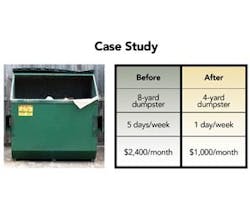For some, waste management isn’t a large part of the maintenance and operations equation. It’s a disregarded notion, like a discarded piece of trash.
“A lot of people don’t take waste management into consideration. It’s an afterthought. It’s out of sight, out of mind,” says Chuck Imm, director of sales for supplier Compactors Inc. “Most decisions involving waste are typically reactive. We’d like to see it be more proactive.”
If you have ever considered trash compactors, let these three elements guide your decision.
1) Waste Stream
Waste can be difficult to manage, but it doesn’t have to be.
“No one has time to take trash to the dumpster, so it piles up and becomes a hassle. Compactors make waste manageable,” says Peter Spano, president of manufacturer and consultant Global Trash Solutions. “A compactor provides a central location for everything.”
Compactors result in waste stream reduction ratios anywhere from five cans to one or 20 to one, depending on size. They are available in sizes as small as a refrigerator or as large as a dumpster corral on a loading dock. This reduction has benefits from increased cleanliness to odor control.
“When evaluating your situation, identify current problems: vermin, spillage, stuff blowing in the parking lot, smells in the summertime,” suggests Barry Boises, owner of manufacturer Precision Machinery.
“Compactors make things run a lot smoother,” Boises adds. “They have just as many intangible benefits as tangible ones.”
2) Waste Budget
Billing for waste services is determined by the amount of trash generated and how frequently it must be hauled away. Just like your electricity bill, both factors can be controlled.
“Don’t think of your trash bill as a fixed utility,” advises Spano. “If you can cut back, you can drastically reduce what you pay.”
Global Trash Solutions helped a Panera Bread restaurant in San Francisco shift from an 8-yard dumpster hauled four or five days a week to a 4-yard dumpster hauled just once a week. Prior to installing the compactor, they paid over $2,400 per month for disposal. Now they pay about $1,000 per month. The average cost for Panera’s compactor model is $12,500.
“Everybody is trying to trim the fat and compaction can pay for itself relatively quickly,” Imm agrees, adding that a Holiday Inn in Deston, FL, noticed a four-month payback period on its machine.
While payback is a big motivator, Imm acknowledges, doing the right thing should be too.
“Many large businesses don’t realize there’s value in their garbage,” Spano agrees.
3) Recycling
Trash compactors can be an integral part of recycling initiatives. The San Francisco Panera Bread has an aggressive recycling plan. Food waste is picked up by organic recyclers for a minimal charge. Other materials removed from the waste stream include plastics, metals, and cardboard.
“Not only does this drastically reduce what goes to the landfill, it also saves on the bill,” Spano says. “You have to pay whatever the landfill or hauler’s rate is, which is much more than what a recycler charges, because those materials are commodities. They’re worth money to the people picking them up.”
Mercy Hospital in Cedar Rapids, IA, is using one of the first compactors of its kind: a dual chamber machine for both trash and recyclables. It compacts waste on one side and holds paper, plastic, and cans on the other side. Those materials are then separated at a local recycling plant.
“We want to be responsible about disposal,” says Les Etscheidt, director of environmental services at the hospital. “Everything we can recycle, we will recycle. This technology is really the only feasible way for us to accomplish that.”
The hospital was able to finance 50% of the upfront cost through grants from the Iowa Department of Natural Resources and the Solid Waste Agency of Linn County. Similar resources may be offered in your area, Etscheidt suggests.
“Make yourself aware of the grants and ask local recycling experts what kind of options you have for your waste problem,” he adds. “If you can divert, we’re all better off.”
Chris Curtland ([email protected]) is assistant editor of BUILDINGS.
